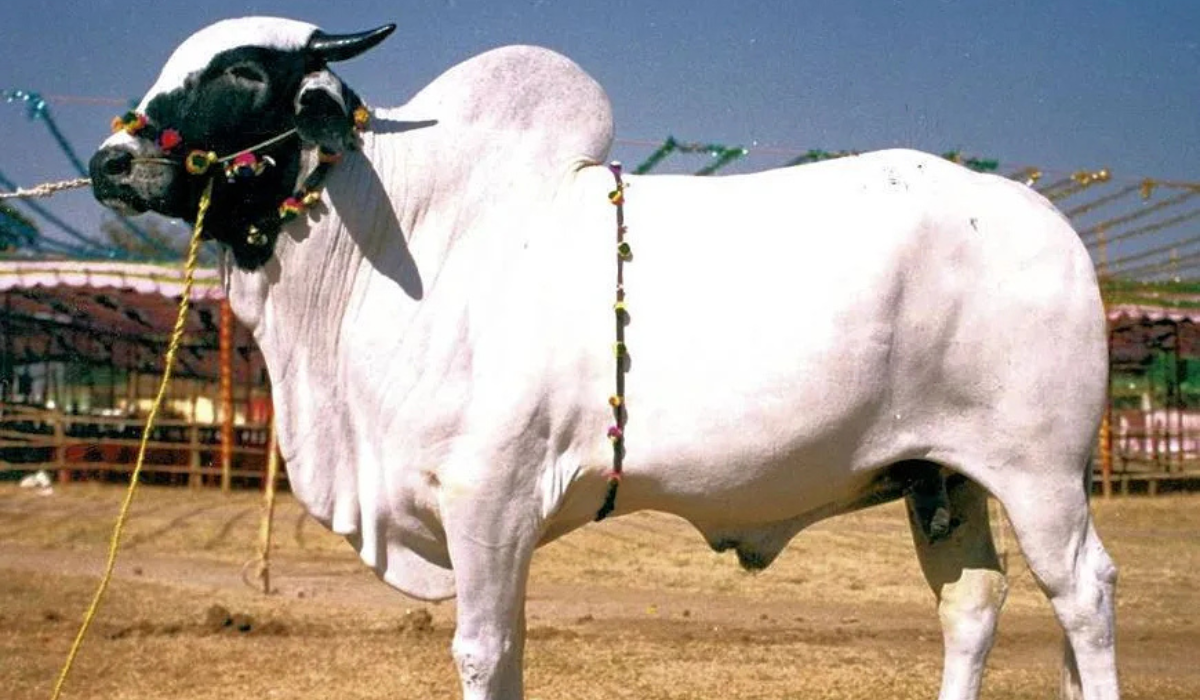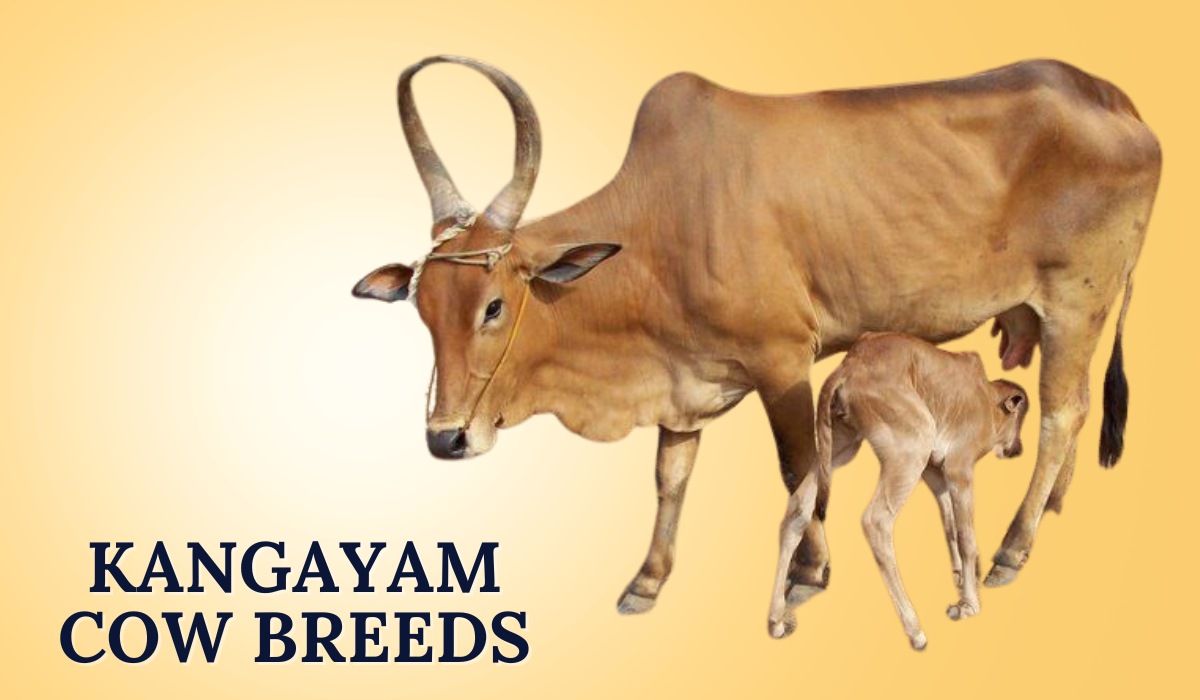The Deoni Cow Breeds In India is a valued indigenous breed from central and western India. It is found mainly in Maharashtra, Telangana, and parts of Madhya Pradesh. Known for its sturdy build and distinct features, the breed is also recognized for its high milk productivity. This makes it a favorite among dairy farmers and agricultural communities. The Deoni cow is resilient to diseases and thrives in tropical climates. These traits make it an excellent choice for regions where other breeds may struggle.
This breed’s adaptability and impressive milk yield offer both economic and practical benefits. It ensures consistent demand and value in the Indian agricultural landscape. Farmers appreciate the Deoni cow for its high milk yield and easy maintenance. Its ability to resist diseases reduces the need for extensive veterinary care. Additionally, it can withstand challenging weather conditions, making it reliable for income generation.
The Deoni cow also has a calm temperament, which simplifies its management. This quality is especially helpful in rural settings. For individuals consbeneficialidering livestock rearing, understanding this breed’s care needs is essential. Learning about its characteristics can provide insights into managing a productive and resilient dairy breed.
History and Origin of Deoni Cows In India
The Deoni cow is named after the Deoni region of Maharashtra, where the breed is believed to have originated. This breed is a cross between the local cattle of the region and foreign breeds like the Sahiwal and Red Sindhi, making it a hybrid with desirable traits from both indigenous and unfamiliar cattle. The Deoni breed thrives in the hot, dry climates of Maharashtra and surrounding regions due to its hardiness and adaptability.
Farmers have historically used Deoni Cow Breeds for both milk production and draught purposes. They have long been essential to the rural economy, providing milk for families and acting as strong draft animals for agriculture. Over time, their milk production capabilities have come to the forefront, leading to their increased demand in the dairy industry. As a result, Deoni cows have become an important part of India’s livestock sector, providing numerous benefits to farmers and dairy producers.
Physical Characteristics of Deoni Cows In India
Deoni Cow Breeds are easily identifiable due to their distinctive physical traits. Here are some of the key characteristics that define the breed:
- Body Structure: Deoni cows are medium-sized animals with a well-proportioned body. They possess a strong, compact frame that suits both milk production and draught work. The muscular build and good stamina of the Deoni cow make it an efficient work animal.
- Coat Color: The coat color of Deoni cows can vary, but the most common colors are white, light brown, or gray. Some cows may also have darker patches around their face, legs, and body, giving them a unique appearance.
- Hump: Like many other Cow Breeds In India, Deoni Cow Breeds possess a well-developed hump over their shoulders. The hump is more pronounced in males, contributing to their strength and physical prowess.
- Udder Size: Deoni cows are known for their well-developed udders, which contribute to their high milk yield. The udder is typically medium to large in size, with a symmetrical shape that facilitates easy milking.
- Horns and Ears: Deoni cows typically have short, backward-curving horns that are medium-sized. Their ears are drooping and medium in size, adding to their distinct appearance.
- Temperament: Known for their calm and docile temperament, Deoni cows are easy to handle and manage, making them ideal for both small-scale and large-scale farmers. They are gentle by nature, making them suitable for farms with children or those new to animal husbandry.
Advantages of Rearing Deoni Cows
Deoni cows offer numerous benefits for farmers, especially those in regions with limited resources or harsh climates. Some of the key advantages of rearing Deoni Cow Breeds include:
- High Milk Production: Deoni cows are excellent milk producers. On average, they can produce 6 to 10 liters of milk per day, with some elite cows yielding up to 15 liters per day. The milk is known for its high butterfat content, making it ideal for dairy products like ghee, butter, and cheese.
- Disease Resistance: One of the standout features of Deoni cows is their strong immune system. The breed is less prone to diseases compared to other breeds, making it easier for farmers to manage their herds with fewer veterinary interventions. This characteristic is particularly beneficial for organic and sustainable farming.
- Adaptability to Harsh Climates: Deoni Cow Breeds are well-suited for the hot, dry, and arid conditions of the Deoni region and surrounding areas. They can withstand high temperatures and limited water availability, which makes them resilient in drought-prone areas.
- Low Maintenance Costs: Deoni cows are hardy and require minimal care compared to unfamiliar breeds. Local feed and environmental conditions suit them well, so they don’t require expensive supplements or special housing.
- Dual Purpose Breed: Deoni cows are considered a dual-purpose breed because they are used for both milk production and draught work. They can efficiently perform agricultural tasks such as plowing and cart pulling, which makes them valuable to farmers in rural areas.
Milk Benefits of Deoni Cows In India
Deoni cow milk is highly nutritious and valued for its quality. Here are some reasons why Deoni cow milk stands out:
- Rich in A2 Protein: Deoni cow milk contains A2 beta-casein protein, which is easier to digest than A1 protein found in many foreign breeds. This makes Deoni milk a better option for people with lactose intolerance or sensitive digestive systems.
- High Fat Content: Deoni cow milk contains a high fat percentage, typically between 4.5% to 5%, making it ideal for producing rich and creamy dairy products like ghee, butter, and paneer.
- Nutrient-Rich Milk: Deoni cow milk is packed with essential nutrients such as calcium, phosphorus, and vitamins A and B12. These nutrients are vital for bone health, immune system support, and overall vitality.
- Antioxidant Properties: Deoni cow milk contains antioxidants, which help in reducing oxidative stress and may lower the risk of chronic diseases. The antioxidants found in Deoni milk contribute to overall health and well-being.
How to Care for Deoni Cows In India
To ensure that Deoni Cow Breeds remain healthy and productive, proper care and management are essential. Here are some key considerations for the care of Deoni cows:
1. Housing and Shelter
- Provide Shade: Deoni Cow Breeds thrive in hot climates, but farmers must provide adequate shade to protect them from excessive heat. Proper ventilation is also necessary to keep them comfortable during the hot months.
- Dry and Clean Environment: Ensure that the cows have access to clean bedding and dry surroundings. Regular cleaning of the barn or shed helps prevent the buildup of bacteria and parasites.
2. Feeding and Nutrition
- Balanced Diet: Deoni cows require a well-balanced diet that includes green fodder, dry hay, and concentrate feed. Providing a variety of feed ensures they get the necessary nutrients to maintain milk production and overall health.
- Mineral Supplementation: It is important to provide mineral supplements, especially in areas where the soil may lack essential nutrients, to prevent deficiencies in the cows’ diet.
3. Health Management
- Regular Vaccination: Vaccinations are critical to preventing common cattle diseases such as foot-and-mouth disease, brucellosis, and tuberculosis. Ensure that your Deoni cows are vaccinated according to veterinary guidelines.
- Deworming: Regular deworming is essential to protect the cows from intestinal parasites, which can affect their health and milk production.
- Routine Veterinary Check-ups: Regular veterinary check-ups help to detect and treat any potential health issues early. This ensures that the cows remain productive and healthy.
4. Breeding
- Selective Breeding: Adopt selective breeding practices to improve desirable traits such as milk yield and disease resistance. This helps in producing high-quality offspring with superior characteristics.
- Artificial Insemination: Farmers may consider using artificial insemination (AI) to improve the genetic quality of their herds, especially for traits like milk production and overall health.
Challenges in Rearing Deoni Cows In India
While Deoni Cow Breeds are hardy and productive, there are some challenges associated with rearing them:
- Feed Availability: During periods of drought or in areas where good quality fodder is scarce, providing sufficient nutrition to Deoni cows may become challenging. Farmers may need to rely on alternative feeds or supplements to meet the nutritional needs of the cows.
- Seasonal Fluctuations in Milk Yield: Milk yield in Deoni cows can fluctuate depending on the availability of green fodder and the weather conditions. In hot and dry months, milk production may decrease.
- Limited Access to Pure Genetics: Like many indigenous breeds, Deoni cows may face challenges related to crossbreeding. Farmers should ensure that they are sourcing high-quality, purebred Deoni cows for breeding purposes to maintain the breed’s desirable traits.
Economic Impact of Deoni Cows In India
The Deoni Cow Breeds plays a vital role in the economy of rural India, particularly in states like Maharashtra and Telangana. With their high milk yield, disease resistance, and low maintenance costs, they provide valuable resources to farmers. In addition to milk production, Deoni cows also serve as work animals for agricultural tasks, contributing to the success of farming operations. By maintaining a steady supply of nutritious milk and offering low-maintenance care, Deoni cows help enhance the livelihoods of farmers in rural India.
Conclusion: Why Deoni Cows Are a Valuable Asset for Farmers
Deoni Cow Breeds are a remarkable indigenous breed that offers a combination of high milk yield, resilience, and dual-purpose utility for Indian farmers. Their ability to adapt to hot, arid climates, combined with their disease resistance and low maintenance needs, makes them an ideal choice for small and medium-scale dairy operations. By understanding the characteristics, benefits, and care requirements of Deoni cows



